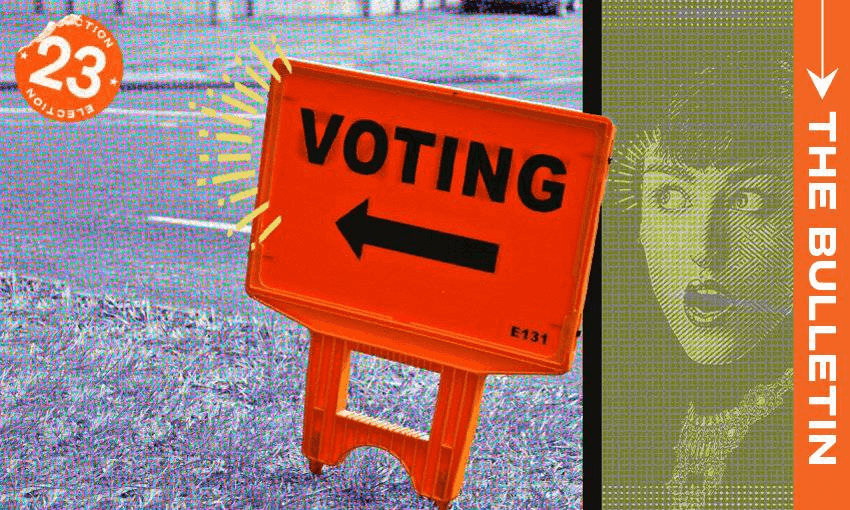Overseas voting opens today and advance voting starts on Monday. How influential could offshore voting be, and why are we still waiting for fiscal plans, asks Anna Rawhiti-Connell in this excerpt from The Bulletin, The Spinoff’s morning news round-up. To receive The Bulletin in full each weekday, sign up here.
Just under two million people voted ahead on election day in 2020
Voting on election day is a tradition in some households. I still remember walking to a polling booth with my parents when they went to cast their votes on election day, and I have repeated the pattern of only voting on election day for the last eight elections. Recent trends suggest those of us who vote on the day are increasingly in the minority. According to Electoral Commission data, of the 2,894,486 people who voted in the 2020 election, 1,976,996 people voted before election day on October 17. In the 2017 election, the biggest day for advance voting was the day before election day. In 2020, it was a whole week before, on October 10. The pandemic undoubtedly got more of us to the polling booth earlier in 2020, so advance voting numbers this year should give us a more unambiguous indication of whether this is a long-term trend. The Electoral Commission begins publishing statistics on how many people have voted from next Tuesday.
‘Scandalous’ fiscal plans haven't yet been released
The NZ Herald published an editorial yesterday (paywalled) announcing the “beginning of the end” of the election campaign. Advance voting begins on Monday, October 2. I mentioned this last week, but the rise of advance voting significantly shortens the campaign runway for all parties. It’s a point being diligently raised by the media, particularly regarding Labour and National, who have yet to release their fiscal plans. Yesterday, the Herald’s Audrey Young called it “scandalous” (paywalled) that the parties haven't done so already. It makes Monday night’s Newshub poll and the 1News Verian poll tonight the last major television network polling before hundreds of thousands of people cast their votes. If you’re torn between Labour and National, the final TVNZ leaders’ debate on October 12 might be more appropriately considered an appeal to the undecided. The rise in advance voting also calls into question the logic of the election day advertising and media blackout, which is meant to prevent voters from being unduly influenced. Asked about the sense of maintaining it in 2020, Grant Robertson said it was a fair point. Australia has a different system, where blackout rules only apply to TV and radio. Australia also has compulsory voting and makes a much bigger deal of election day with the famous democracy sausages, but rules there are also regarded as ridiculous and unfair.
‘Letting Australia decide’
Speaking of Australia, a new campaign has been launched to rally the Australian vote in our election. As Tracy Lee points out on The Spinoff this morning, one million New Zealanders currently live overseas, representing 20% of New Zealand’s resident population and eligible voters. Almost 70% of New Zealand’s offshore citizens reside in Australia, which could mean up to half a million votes in the New Zealand election. Delightfully, Lee refers to Australia as New Zealand’s “West Island”, which might soften the blow of the campaign’s tongue-in-cheek message of “letting Australia decide“. Overseas voting and voting for those who need help via a telephone dictation voting service starts today.
Does more advance voting impact results?
In 2020, Claire Robinson concluded that advance voting probably benefits the traditional major parties and that the so-called minor parties benefit from late strategic voting. “Since the MMP system began, the minor party vote has been highest in the elections where the pre-election poll gap between the major parties has been widest. With last night’s gap between Labour and National remaining a whopping 15 points, it looks like the Greens and ACT will be the beneficiaries of late strategic voting, not either of the major parties.”
Finally, Paddy Gower hosts the Newshub leaders’ debate tonight, the last leader’s debate before advance voting begins. Reading this account of the 2020 Newshub debate feels like reading a history book at this point, but it’s also the debate where Ardern stepped up a notch. Gower sounds like he’s been in a state of deep preparation for a while for tonight’s debate. As always, we’ll be watching, live blogging and delivering verdicts.


